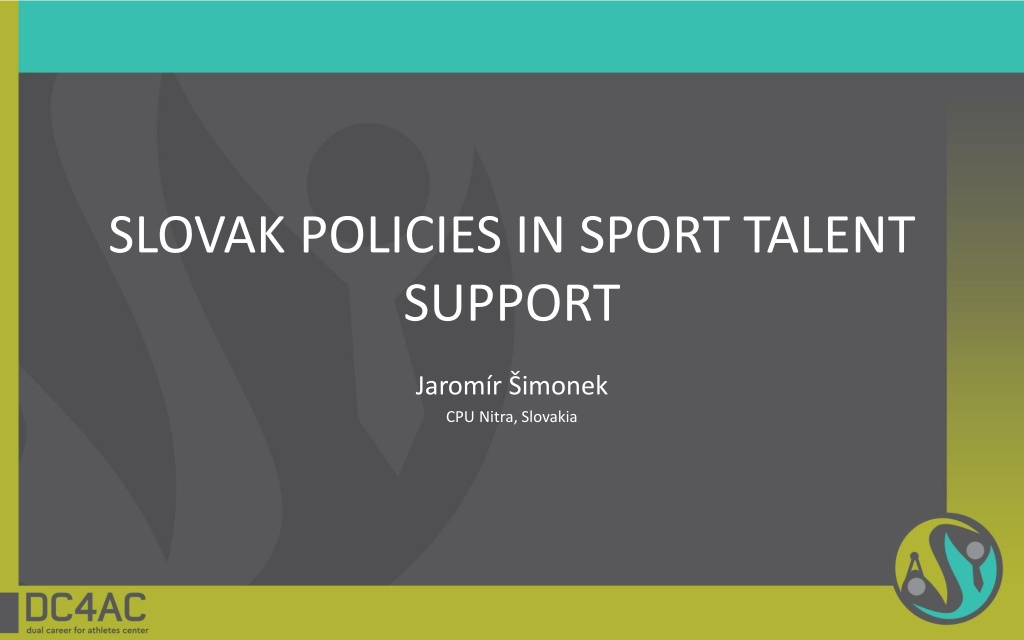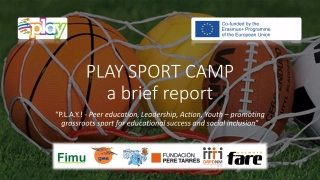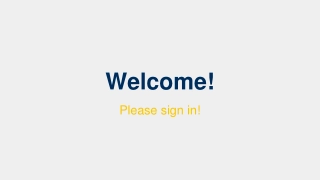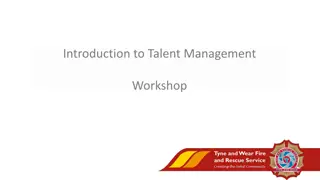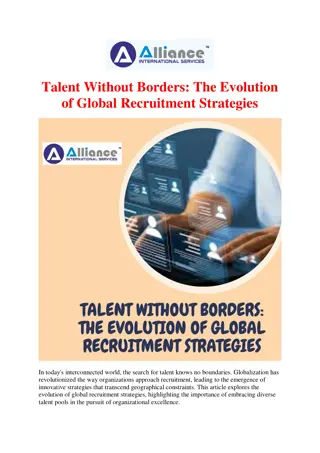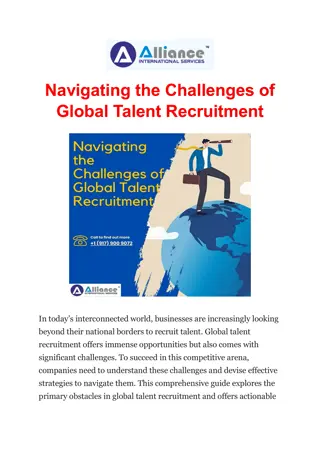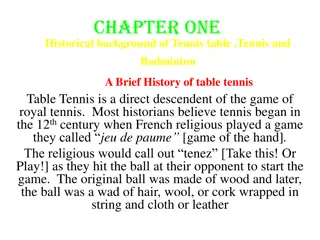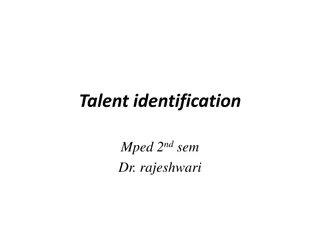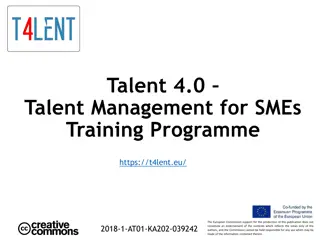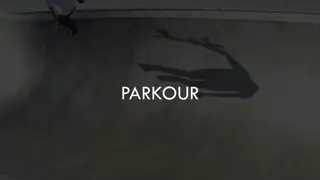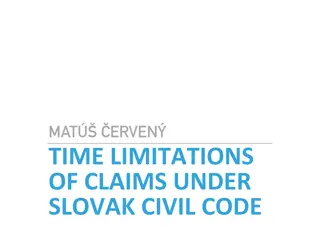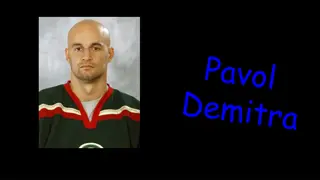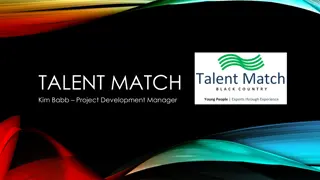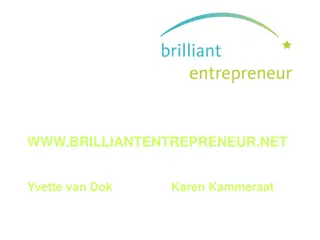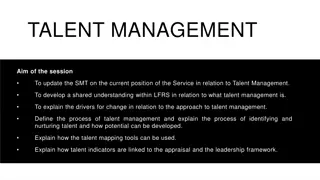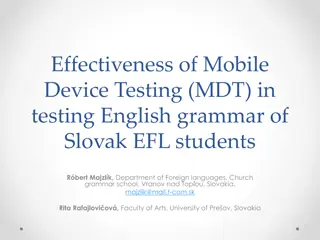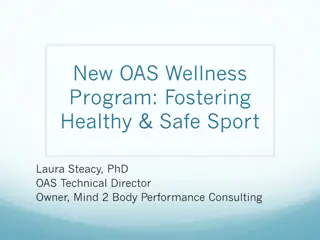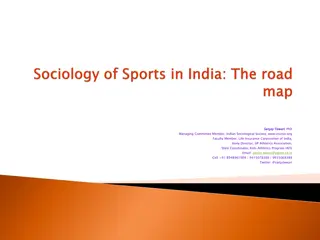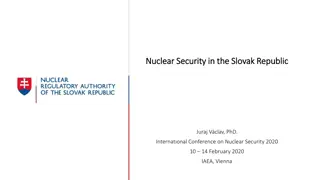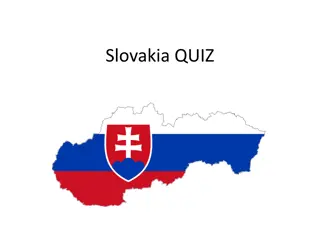Slovak Policies in Sport Talent Support Overview
Slovak Policies in Sport Talent Support encompass various initiatives such as the Act on Sport No. 440, which includes provisions for supporting athletes, defining terms like professional athlete and talented athlete, and outlining social benefits for athletes in Slovakia. The Act establishes guidelines for secondary sport schools, cooperation with sports organizations, and the recognition of talented athletes by the Ministry, in efforts to nurture and develop sporting talent in the country.
Download Presentation

Please find below an Image/Link to download the presentation.
The content on the website is provided AS IS for your information and personal use only. It may not be sold, licensed, or shared on other websites without obtaining consent from the author.If you encounter any issues during the download, it is possible that the publisher has removed the file from their server.
You are allowed to download the files provided on this website for personal or commercial use, subject to the condition that they are used lawfully. All files are the property of their respective owners.
The content on the website is provided AS IS for your information and personal use only. It may not be sold, licensed, or shared on other websites without obtaining consent from the author.
E N D
Presentation Transcript
SLOVAK POLICIES IN SPORT TALENT SUPPORT Jarom r imonek CPU Nitra, Slovakia
SLOVAK POLICIES IN SPORT TALENT SUPPORT Act on Sport No. 440 (January 1, 2016) Public Notice No. 110 (February 18, 2016) Public Notice No. 51 (January 1, 2016) Cooperation with sportsmen & scientists Meeting of sport organizations (May 2016)
ACT ON SPORT No. 440 SECONDARY SPORT SCHOOL will provide: a) comprehensive secondary education (e.g. servicing and maintenance of sport facilities), b) secondary general education (the current secondary grammar school study programme 7902 J 77 sport), c) complete secondary professional education (e.g. sport management, sport organizer, sport expert, etc.).
ACT ON SPORT No. 440 DEFINITION OF TERMS: (3) Professional athlete performs sport... a) based on the contract on professional performance of sport b) based on labour-legal relationship c) as an independent earner (taxpayer).
SOCIAL BENEFITS OF ATHLETES In Slovakia - 700 1000 active athletes earning on average between 1,000 and 3,000 EUR. Before adopting the new Act on Sport the state did not receive any tax payments from employers (sport associations and clubs). The state received only contributions into the funds from athletes. After adopting the new Act on Sport sport associations and clubs have to transfer 35% tax levies into the state funds. Athletes then legitimately can claim old-age pension.
ACT ON SPORT No. 440 DEFINITION OF TERMS: (5) Talented athlete is the athlete aged 18 years and less, who manifested high level of talent, sport skills and sport abilities and is listed in the list of talented athletes at the Ministry; *(national sport association can define higher limit of age of talented athlete, however, max. up to 23 years of age).
16 - NATIONAL SPORT ASSOCIATION a) takes care of talented athletes, b) lists athletes in the list of talented athletes according to the performance criteria defined by them, c) keeps evidence and publicize the list of talented athletes, d) methodically manages the preparation of talented athletes.
33 - BASIC OBLIGATIONS OF SPORT ORGAN. Sport organization, for which the athlete performs sport activity based on the contract on professional performance of sport, has the following obligations: a) to ensure permanent preparation of the athlete for competition and participation of the athlete in competitions under the leadership of the coach with the required professional capability, b) to pay the athlete the agreed wage, c) to create suitable material conditions for sport performance,
33 - BASIC OBLIGATIONS OF SPORT ORGAN. d) to allow for participation of the representative athlete in sport representation, e) to ensure health care, regeneration and rest of the athlete f) to allow the athlete for the preparation for the job, if the athlete is the pupil at secondary school or at university.
48 - CONTRACT ON THE PREPARATION OF TALENTED ATHLETE (1) The contract on preparation of talented athlete must include also the obligation of the sport organization to: a) cover the expenses of the preparation of the talented athlete for performing sport in the sport organization, b) respect the choice of the talented athlete in terms of secondary school or higher educational institution and for the preparation for the job, c) organize sport preparation so that educational process of the talented athlete was ensured.
PUBLIC NOTICE No. 110 Requirements on the professional skills necessary for the performance of the activity of a coach of 1st and 2nd qualification degree (3rd and 4th in European qualification framework): - reaching performance level specified by the sport union, - passing the exam from the general subjects, - passing the exam from the special sport subjects.
PUBLIC NOTICE No. 51 2 Conditions for the entitlement to a social benefit (1) The entitlement to a social benefit applies to the natural person, who: a) won as the sport representative of the SR: - gold, silver or bronze medal at Olympic games, Paralympic games or Deaflympic games,
PUBLIC NOTICE No. 51 - gold, silver or bronze medal at World championships, or - gold medal at European championships in the sport event listed in the programme of Olympic Games which were held in the calendar year, in which the WC or EC were organized.
PUBLIC NOTICE No. 51 b) is the citizen of the Slovak Republic, c) has permanent address on the territory of the SR d) does not receive similar benefit abroad, e) reached the retiring age.
Meeting of sport organizations (Bratislava, May 2016) Participants: Sport experts from sport unions and clubs Sport experts from universities Sportsmen The aim: to discuss the issues of education of sportsmen in line with the new Act on Sport; - to initiate cooperation of sport unions and universities; - to support the project Dual Career in S - to distribute questionnaires to partcipants
COOPERATION WITH SCIENTISTS - research carried out in 2015 by K. Geraniosova & Noora Ronkainen (Denmark) The Experience of Dual Career through Slovak Athletes Eyes
The Experience of Dual Career through Slovak Athletes Eyes The aim: - to examine how Slovak athletes experience dual career, - to gain an understanding of the athletes attitudes towards education as well as perceived difficulties in pursuing dual career. - 5 athletes were interviewed for approx. 105 .
RESULTS OF THE STUDY The student-athletes: - were assisted by simple supportive structures, - were provided with flexible arrangements, - peers played an important role in decision-making concerning DC, Deficiences: - the teachers prejudice against the athletes based on their athletic role, - the lack of dual career structures appeared to be significant in dual career support
RESULTS OF THE STUDY - negative perception of athletes and sport science students by educational representatives. - this may be a hurdle to be overcome in future dual career development. (PHYSICAL CULTURE AND SPORT. STUDIES AND RESEARCH, VOLUME LXI, 2015, pp. 53-64) https://www.degruyter.com/view/j/pcssr.2015.66.issue-1/pcssr-2015- 0005/pcssr-2015-0005.xml
